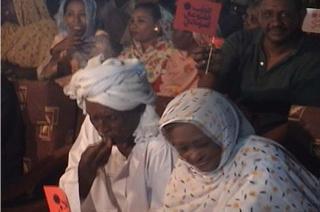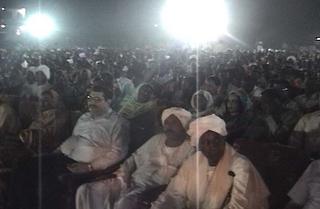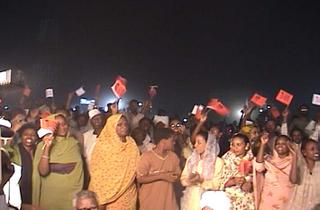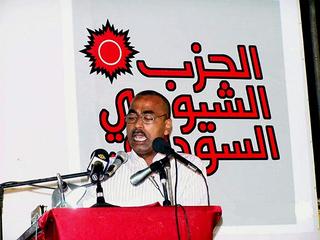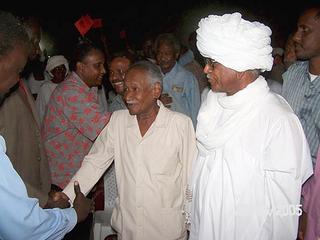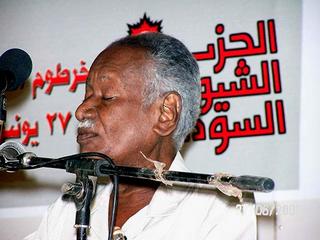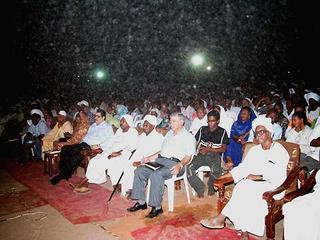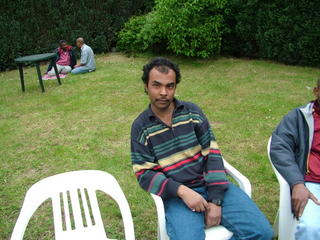Protocol
Between
THE GOVERNMENT OF SUDAN
(GOS)
AND
THE SUDAN PEOPLE’S LIBERATION MOVEMENT (SPLM)
ON
POWER SHARING
Naivasha, Kenya, Wednesday, May 26, 2004
PREAMBLE:
CONSCIOUS of the need for an expeditious termination of Sudan's protracted and costly war;
MINDFUL AND AWARE of the yearning of all the Sudanese for a quick, just and sustainable peace;
ENCOURAGED by the progress made thus far in our pursuit for realizing comprehensive Peace Agreement in the Sudan;
DETERMINED to crown the valuable achievement of this Peace Process by arriving at an equitable and fair formula for sharing power in the Sudan;
RESOLVED to usher in an era of responsible, just, transparent, people-led and integrity based governance;
CONVINCED that decentralization and empowerment of all levels of government are cardinal principles of effective and fair administration of the country;
COGNIZANT of the fact that the smooth and successful implementation of this agreement shall, to a large measure, hinge on rallying the majority of the Sudanese people behind it; and
CONVINCED that the successful implementation of this agreement shall provide a model for good governance in Sudan that shall help to create a solid basis to make unity of the country attractive and preserve peace.
NOW THEREFORE, the Government of the Sudan (GOS) and the Sudan People’s Liberation Movement (SPLM) hereby agree as follows:-
PART I
1. GENERAL PRINCIPLES
1.1 In accordance with the Machakos Protocol agreed to at Machakos, Kenya, on 20th July, 2002, the following Protocol on Power Sharing forms an integral part of the overall Peace Agreement.
1.2 The Parties reaffirm their acceptance of the Agreed Principles (of Governance) as stipulated in the Machakos Protocol of 20th July, 2002. The modalities of implementation of these principles are the object of the present Protocol on Power Sharing.
1.3 In accordance with the Machakos Protocol, the structures of governments in the Sudan shall be as follows during the Interim Period:-
1.3.1 The National level of Government which shall exercise authority so as to protect and promote the national sovereignty of Sudan and the welfare of its people;
1.3.2 The Southern Sudan level of Government which shall exercise authority in respect of the people and States in the South;
1.3.3 The States throughout Sudan which shall exercise authority at the state level and render public services through the level of government close to the people; and
1.3.4 The level of local government throughout the Sudan.
1.4 The Parties agree that the following principles shall guide the distribution of powers and the establishment of structures:
1.4.1 Recognition of both the sovereignty of the nation as vested in its people as well as the need for autonomy of the Government of Southern Sudan and States throughout the Sudan;
1.4.2 Affirmation of the need for both national as well as state and Southern Sudan norms and standards so as to reflect the unity of the country and the diversity of the Sudanese people;
1.4.3 Acknowledgement of the need to promote the welfare of the people and protect their human rights and fundamental freedoms;
1.4.4 Recognition of the need for the involvement and participation of the people of South Sudan at all levels of government and National institutions as an expression of the national unity of the country;
1.4.5 Pursuit of good governance, accountability, transparency, democracy, and the rule of law at all levels of government to achieve lasting peace;
1.4.6 Recognizing the need to legitimize the arrangements agreed to herein, fair electoral laws shall be adopted, including the free establishment of political parties. Elections at all levels of government shall be held by universal adult suffrage.
1.5 Principles of Administration and Inter-Governmental Linkages:
1.5.1 In the administration of the Government of National Unity, the following provisions shall be respected:-
1.5.1.1 There shall be a decentralized system of government with significant devolution of powers, having regard to the National, Southern Sudan, State, and Local levels of government;
1.5.1.2 The Interim National Constitution, being the legal and constitutional framework text adopted as contemplated in paragraph 2.12.6 herein, shall be the Supreme Law of the land and the Southern Sudan Constitution, state constitutions, and the laws of all levels of government must comply with it;!
1.5.1.3 The linkage between the National Government and the states in the Southern Sudan shall be through the Government of Southern Sudan, subject to paragraph 1.5.1.4 below, and as provided for in the Interim National Constitution and the Southern Sudan Constitution;
1.5.1.4 In their relationships with each other or with other government organs, all levels of government and particularly National, Southern Sudan, and State Governments shall:
(a) Respect each others’ autonomy;
(b) Collaborate rather than compete, in the task of governing and assist each other in fulfilling each others’ constitutional obligations;
(c) Perform their functions and exercise their powers so as:
i) Not to encroach on another level’s powers or functions;
ii) Not to assume another level’s powers or functions conferred upon it by the Constitution;
iii) To promote co-operation between them;
iv) To promote open communication between government and levels of government;
v) To strive to render assistance and support to other levels of government;
vi) To advance the good co-ordination of governmental functions;
vii) To adhere to procedures of inter-governmental interaction as agreed upon;
viii) To promote amicable settlement of disputes before attempting litigation;
ix) To respect the status and institutions of other levels of government.
(d) Allow the harmonious and collaborative interaction of the different levels of government within the context of national unity and for the achievement of a better quality of life for all.
1.6 Human Rights and Fundamental Freedoms:
1.6.1 The Republic of the Sudan, including all levels of Government throughout the country, shall comply fully with its obligations under the international human rights treaties to which it is or becomes a party. These include the International Covenant on Civil and Political Rights, the International Covenant on Economic, Social and Cultural Rights, the International Convention on the Elimination of All Forms of Racial Discrimination, the C! onvention on the Rights of the Child, the Slavery Convention of 1926, as amended, and the related Supplementary Convention, the International Convention on the Suppression and Punishment of the Crime of Apartheid, the International Convention Against Apartheid in Sports, the Convention Relating to the Status of Refugees and the Related Protocol, and the African Charter on Human and People’s Rights. The Republic of the Sudan should endeavor to ratify other human rights treaties which it has signed.
1.6.2. The rights and freedoms to be enjoyed under Sudanese law, in accordance with the provisions of the treaties referred to above, include in particular the following:-
1.6.2.1 Life
Every human being has the inherent right to life. This right shall be protected by law. No one shall be arbitrarily deprived of his/her life;
1.6.2.2 Personal Liberty
Everyone has the right to liberty and security of person. No one shall be subjected to arbitrary arrest or detention. No one shall be deprived of his/her liberty except on such grounds and in accordance with such procedures as are established by law;
1.6.2.3 Slavery
No one shall be held in slavery; slavery and the slave trade in all their forms shall be prohibited. No one shall be held in servitude or be required to perform forced or compulsory labour;
1.6.2.4 Torture
No one shall be subjected to torture or to cruel, inhuman or degrading treatment or punishment;
1.6.2.5 Fair Trial
(a) Anyone who is arrested shall be informed, at the time of arrest, of the reasons for his/her arrest and shall be promptly informed of any charges against him/her;
(b) In the determination of any criminal charges against him/her, or of his/her rights and obligations in a suit at law, everyone shall be entitled to a fair and public hearing by a competent, independent and impartial tribunal established by law;
(c) Everyone charged with a criminal offence shall have the right to be presumed innocent until proved guilty according to law;
(d) No one shall be held guilty of any criminal offence on account of any act or omission which did not constitute a criminal offence under national or international law at the time when it was committed;
(e) In the determination of any criminal charge against him/her, everyone shall be entitled, in full equality, to be tried without undue delay, to be tried in his/her presence and to defend himself/herself in person or through legal assistance of his/her own choosing and to have legal assistance assigned to him/her in any case where the interests of justice so require.
1.6.2.6 Privacy
No one shall be subjected to arbitrary or unlawful interference with his/her privacy, family, home or correspondence;
1.6.2.7 Freedom of Thought, Conscience and Religion
Everyone shall have the right to freedom of thought, conscience and religion;
1.6.2.8 Freedom of Expression
Everyone shall have the right to freedom of expression;
1.6.2.9 Freedom of Assembly and Association
The right of peaceful assembly shall be recognized. Everyone shall have the right to freedom of association with others, including the right to form and join trade unions for the protection of his/her interests;
1.6.2.10 Family and Marriage
(a) The family is the natural and fundamental group unit of society and is entitled to protection by society and the State;
(b) The right of men and women of marriageable age to marry and to found a family shall be recognized, according to their respective family laws.
1.6.2.11 Right to Vote
Every citizen shall have the right and the opportunity, without distinctions and unreasonable restrictions, to vote and to be elected at genuine periodic elections, which shall be by universal and equal suffrage and shall be held by secret ballot, guaranteeing the free expression of the will of the electors;
1.6.2.12 Equality Before the Law
All persons are equal before the law and are entitled without any discrimination to the equal protection of the law;
1.6.2.13 Freedom from Discrimination
The law shall prohibit any discrimination and guarantee to all persons equal and effective protection against discrimination on any ground such as race, colour, sex, language, religion, political or other opinion, national or social origin, property, birth or other status;
1.6.2.14 Freedom of Movement
Everyone has the right to liberty of movement and freedom to choose his/her residence;
1.6.2.15 The Rights of Children
Every child shall have, without any discrimination as to race, colour, sex, language, religion, national or social origin, property or birth, the right to such measures of protection as are required by his/her status as a minor.;
1.6.2.16 Equal Rights of Men and Women
(a) The equal right of men and women to the enjoyment of all civil and political rights set forth in the International Covenant on Civil and Political Rights and all economic, social, and cultural rights set forth in the International Covenant on Economic, Social and Cultural Rights shall be ensured;
(b) The human rights and fundamental freedoms embodied in the International Covenant on Civil and Political Rights (ICCPR) shall also be reflected in the Interim National Constitution. No derogation from these rights and freedoms shall be made under the Constitution or under the ICCPR except in accordance with the provisions thereof a! nd only with the approval of the Presidency and the National Legislature, as required by Section 2.3.14 herein;
(c) These human rights and fundamental freedoms shall be monitored by the Human Rights Commission specified in paragraph 2.10.1.2 herein.
1.7 Reconciliation:
The Parties agree to initiate a comprehensive process of national reconciliation and healing throughout the country as part of the peace building process. Its mechanisms and forms shall be worked out by the Government of National Unity.
1.8 Population Census, Elections and Representation:
1.8.1 Population census throughout the Sudan shall be conducted and completed by the end of the second year of the Interim Period;
1.8.2 The preparation, planning and organization for the census shall commence as soon as the Peace Agreement is signed;
1.8.3 General Elections at all levels of government shall be completed by the end of the third year of the Interim Period;
1.8.4 Six months before the end of the periods referred to in Sub-Paragraphs. 1.8.1 and 1.8.3 the Parties shall meet and review the feasibility of the dates set out in the above-mentioned sub-Paragraphs.
1.8.5 Certain considerations, while not conditional upon their completion, should be taken into account with respect to the timing of the elections (including, inter alia, resettlement, rehabilitation, reconstruction, repatriation, building of structures and institutions, and consolidation of the Peace Agreement);
1.8.6 Whoever runs in any election must respect, abide by, and enforce the Peace Agreement;
1.8.7 International observers shall participate in the observation of elections;
1.8.8 Representation of the north and the south at the National level shall be based on population ratio;
1.8.9 The percentages agreed herein are temporary and shall either be confirmed or adjusted on the basis of the census results.
PART II
2. INSTITUTIONS AT THE NATIONAL LEVEL:
2.1 During the Interim Period, the Institutions at the National level shall consist of:-
2.1.1 The Legislature;
2.1.2 The Executive;
2.1.3 The Judiciary; and
2.1.4 The Institutions and Commissions specified in this Agreement and the Interim National Constitution.
2.2. The National Legislature:
2.2.1 There shall be a bicameral National Legislature comprised of:-
2.2.1.1 A National Ass! embly; and
2.2.1.2 A Coun! cil of States.
2.2.2. In the establishment of the National Legislature, the following principles shall apply:-
2.2.2.1. There shall be equitable representation of the people of South Sudan in both legislative chambers; and
2.2.2.2. Relevant considerations shall be taken into account in determining what constitutes equitable representation.
2.2.3 The National Legislature shall be structured and operate as follows:-
2.2.3.1 The National Assembly shall be elected in accordance with the procedures set forth by an impartial and representative Electoral Commission and in accordance with fair electoral laws;
2.2.3.2 There shall be a Council of States comprised of two representatives from each state;
2.2.3.3 Free and fair elections for the National Assembly shall be conducted in accordance with the Interim National Constitution governing the Interim Period. The date shall be determined by the Parties signatory to this Agreement, after consulting with the Electoral Commission.
2.2.4 Pending the elections referred to above, the National Assembly shall consist of such members representing the Parties to the Agreement, and other forces in the North and South so as to promote inclusiveness and stability, in such proportions to be determined by the parties prior to the conclusion of the Peace Agreement.
2.2.5 Prior to the Parliamentary elections, the seats of the National Assembly shall be allocated as follows:
(a) National Congress Party (NCP) shall be represented by Fifty Two Per Cent (52%);
(b) Sudan People’s Liberation Movement (SPLM) shall be represented by Twenty Eight Per Cent (28%);
(c) Other Northern political forces shall be represented by Fourteen Per Cent (14%);
(d) Other Southern political forces shall be represented by Six Percent (6%);
2.2.6 Both Chambers of the National Legislature shall approve the allocation of resources and revenues, in accordance with the agreement of Wealth Sharing. The National Assembly shall approve the annual National budget.
2.2.7 Amendments to the National Constitution shall require:-
2.2.7.1 The approval of three-quarters (75%) of all the members of each chamber, both chambers sitting separately, and only after introduction of the draft amendment at least two months prior to debate;
2.2.7.2 Amendments to the Interim National Constitution affecting the provisions of the Peace Agreement may be introduced only with the approval of both Parties signatory to this Agreement;
2.2.7.3 A sixty-six and two-thirds percent (66.6%) majority in the Council of States is required to pass legislation that affects the interests of the states and a simple majority vote of both chambers is required to pass all other legislation.
2.2.8 Any bill duly approved by the National Legislature shall be signed into law by the President within thirty (30) days, failing which it shall be deemed to have been so signed. Where the President withholds his/her signature, he/she must present reasons for his/her refusal to so sign when re-introducing the bill to the Nation! al Legislature within the 30-day period stated herein. The Bill shall become law if the National Legislature again passes the bill by a two-thirds majority of all the members of the respective house or houses and the assent of the President shall not be required.
2.2.9. The exclusive legislative powers of the National Legislature shall be in respect of the matters set forth in Schedule A, annexed hereto.
2.2.10 The concurrent legislative powers of the National Legislature shall be those matters as set forth in Schedule D, read together with Schedule F, annexed hereto.
2.2.11 The residual legislative powers shall be exercised in accordance with Schedule E annexed hereto.
2.2.12 Both chambers of the National Legislature shall elect their respective Speakers, Deputy Speakers and other officers at their first sitting. The two Parties shall be adequately represented in these offices.
2.2.13 Both Chambers of the National Legislature shall respectively determine their own rules, procedures, committees, and other matters of a similar nature.
2.3. The National Executive:
2.3.1 The National Executive shall consist of the Presidency and a Council of Ministers.
2.3.2 There shall be established the Institution of the Presidency consisting of the President and two Vice Presidents.
2.3.3 The functions of the two Vice Presidents shall be clearly defined by the parties to this agreement.
2.3.4 There shall be a partnership and collegial decision-making process within the Institution of the Presidency in order to safeguard the Peace Agreement.
2.3.5 Until such time as elections are held, the current incumbent President (or his successor) shall be the President and Commander-in-Chief of the Sudan Armed Forces {SAF}. The current SPLM Chairman (or his successor) shall be the First Vice President and shall at the same time hold the posts of President of the Government of Southern Sudan (GOSS) and Commander-in-Chief of the Sudan People’s Liberation Army (SPLA).
2.3.6 In respect of the following matters, the President shall take decisions with the consent of the First Vice President, namely:-
2.3.6.1 Declaration and termination of a state of emergency;
2.3.6.2 Declaration of war;
2.3.6.3 Appointments that the President is required to make according to the Peace A! greement, {to be specified}; and
2.3.6.4 Summoning, adjourning, or proroguing the National
Legislature.
2.3.7 The President shall be elected in national elections, the timing of which ! shall be subject to the agreement of the two parties. The President elect shall appoint two Vice Presidents, one from the South and the other from the North. If the President-elect is from the North, the position of the First Vice President shall be filled by the person who has been elected to the post of President of the Government of Southern Sudan, as the Pre! sident's appointee to the said position. In the event that a person from the South wins the Presidential elections, the President-elect shall appoint the First Vice President from the North. All the other provisions in this agreement relating to the presidency shall continue to apply.
2.3.8 Should the post of the President fall vacant, the functions of the President shall be assumed by a Presidential Cou! ncil comprising of the Speaker of the National Assembly, the First Vice President and the Vice President.
2.3.8.1 The Speaker of the National Assembly shall be Chairperson of the Council in the period prior to elections, after elections the First Vice President shall be the chairperson of the Council;
2.3.8.2 The Presidential Council shall take its decision by consensus;
2.3.8.3 The Vice President shall be Commander-in-Chief of the Sudan Armed Forces {SAF}.
2.3.9 Should the post of the President fall vacant in the period prior to elections, the Office of the President shall be filled by the nominee of the National Congress ! Party within two weeks.
2.3.10 Should the post of the President fall vacant in the period after the elections, the post shall be filled through presidential elections which shall be held within sixty {60} days.
2.3.11 Should the post of the First Vice President fall vacant:-
2.3.11.1 Prior to elections, the office of the First Vice President shall be filled by the nominee of the SPLM within two weeks;
2.3.11.2 After the elections, the President shall appoint a First Vice President in accordance with the Interim National Constitution and the provisions of this Peace Agreement.
2.3. 12 The President shall, within 30 days of the entry into force of the Peace Agreement, and in consultation with the First Vice President, establish a Council of Ministers, having due regard to the need for inclusiveness and diversity in the establishment of a Government of National Unity. The Cabinet Ministers shall be accountable to the President and the National Assembly in the performanc! e of their functions and may be removed by a resolution supported by two-thirds of all the members of the National Assembly.
2.3. 13 The President, the First Vice President and the Vice President shall be members of the Council of Ministers.
2.3. 14 The National Legislature shall be required to approve declarations of war or state of emergency, but in either event, there shall be no derogation from the provisions of the Peace Agreement, except as may be provided herein.
2.3. 15 Any Executive Orders or other legal acts by the President of the Republic shall be discussed with, and adopted by the Council of Ministers.
2.4 National Capital:
2.4.1 Khartoum shall be the Capital of the Republic of the Sudan. The National Capital shall be a symbol of national unity that reflects the diversity of Sudan.
2.4.2 The Administration of the National Capital shall be representative; and during the Interim Period the two Parties shall be adequately represented in the administration of the National Capital.
2.4.3 Human rights and fundamental freedoms as specified in the Machakos Protocol, and in the Agreement herein, including respect for all religions, beliefs and customs, shall be guaranteed and enforced in the National Capital, as well as throughout the whole of Sudan, and shall be enshrined in the Interim National Constitution.
2.4.4 Law enforcement agencies of the Capital shall be representative of the population of Sudan and shall be adequately trained and made sensitive to the cultural, religious and social diversity of all Sudanese.
2.4.5 Without prejudice to the competency of any National Institution to promulgate laws, Judges and law enforcement agents shall, in dispensing justice and enforcing current laws in the National Capital be guided by the following:-
2.4.5.1 Tolerance shall be the basis of coexistence between the Sudanese people of different cultures, religions and traditions;
2.4.5.2 Behavior based on cultural practices and traditions which does not disturb public order, is not disdainful of other traditions, and not in flagrant disregard of the law or disturbing public order shall be deemed in the eyes of the law as an exercise of personal freedoms;
2.4.5.3 Personal privacy is inviolable and evidence obtained in violation of such privacy shall not be admissible in the court of law;
2.4.5.4 The judicial discretion of courts to impose penalties on non-Muslims shall observe the long-established legal {Sharia} principle that non-Muslims are not subject to prescribed penalties, and therefore remitted penalties shall apply;
2.4.5.5 Leniency and granting the accused the benefit of doubt are legal principles of universal application, especially in the circumstances of a poor society like the Sudan, which is just emerging from war, characterized by prevalent poverty and subject to massive displacement of people.
2.4.6 A special commission shall be appointed by the Presidency to ensure that the rights of non-Muslims are protected in accordance with the aforementioned guidelines and not adversely affected by the application of Sharia Law in the Capital. The said commission shall make its observations and recommendations to the Presidency.
2.4.7 Additionally, a system of mechanisms of guarantees shall be established to operationalize the above points, which includes:-
2.4.7.1 Judicial circulars to guide the courts as to how to observe the foregoing principles;
2.4.7.2 Establishment of specialized courts; and
2.4.7.3 Establishment of specialized Attorney General circuits to conduct investigations and pre-trial proceedings related to offences involving these principles.
2.5. The Government of National Unity:
2.5.1 During the Interim Period, there shall be a Government of National Unity reflecting the need for inclusiveness, the promotion of national unity, and the defense of national sovereignty, and the respect and implementation of Peace Agreement.
2.5.2 The Presidency and Council of Ministers shall exercise the Executive powers and competencies in respect of the matters in Schedules A and D, read together with Schedules E and F, and as conferred upon it by this Agreement and the Interim National Constitution.
2.5.3 Cabinet posts and portfolios in all clusters, including the National Sovereignty Ministries, shall be shared equitably and qualitatively by the two Parties. The Parties agree to cluster the National ministries under the implementation modalities.
2.5.4 Representation of the SPLM and other political forces from the South in each of the clusters shall be determined by the Parties Signatory to Agreement prior to the conclusion of the Peace Agreement.
2.5.5 Prior to elections, the seats of the National Executive shall be allocated as follows:-
(a) The National Congress Party shall be represented by Fifty Two Percent (52%);
(b) Sudan People’s Liberation Movement (SPLM) shall be represented by Twenty Eight Per Cent (28%);
(c) Other Northern political forces shall be represented by Fourteen Per Cent (14%);
(d) Other Southern political forces shall be represented by Six Percent (6%);
2.5.6 The Government of National Unity shall be responsible for the administration and functioning of the State and the formulation and implementation of national policies in accordance with the Interim National Constitution.
2.5.6 The Government of National Unity shall be responsible for establishing recruitment systems and admission policies to national universities, national institutes, and other institutions of higher education based on fair competition, giving equal opportunity to all citizens.
2.5.8 The Government of National Unity shall make decisions related to the ongoing or future activities of the organizations of the United Nations, bilateral, national, or international governmental and non-governmental organizations (NGOs), with a view toward ensuring equitable and transparent distribution of projects, activities, and employment of personnel in the whole of Sudan and especially the reconstruction of the war affected areas. There is to be an equivalent obligation on all levels of Government! .
2.5.9. The Government of National Unity shall implement an information campaign throughout Sudan in all national languages in Sudan to popularize the Peace Agreement, and to foster national unity, reconciliation and mutual understanding.
2.6 Civil Service:-
2.6.1 The Government of National Unity shall also ensure that the National Civil Service, notably at the senior and middle-levels, is representative of the people of Sudan. In so doing, the following principles shall be recognized:-
2.6.1.1 Imbalances and disadvantages which exist must be redressed;
2.6.1.2 Merit is important and training is necessary;
2.6.1.3 There must be fair competition for jobs in the National Civil Service;
2.6.1.4 No level of government shall discriminate against any qualified Sudanese citizen on the basis of religion, ethnicity, region, gender, or political beliefs;
2.6.1.5 The National Civil Service will fairly represent all the people of the Sudan and will utilize affirmative action and job training to achieve equitable targets for representation within an agreed time frame;
2.6.1.6 Additional educational opportunities shall be created for war- affected people.
2.6.2 In order to create a sense of national belonging and address imbalances in the National Civil Service, a National Civil Service Commission shall be established with the task of:-
2.6.2.1 Formulating policies for training and recruitment into the civil service, targeting between Twenty – Thirty Percent (20% - 30%) of the positions, confirmed upon the outcome of the census referred to herein, for people of Sout! h Sudan who qualify;
2.6.2.2 Ensuring that not less than Twenty Percent (20%) of the middle and upper level positions in the National Civil Service (including the positions of Under Secretaries) are filled with qualified persons from the South within the first three years and achieving twenty Five Percent (25%) in five years and the final target figure referred to in sub-paragraph 2.6.2.1 above, within six years; and
2.6.2.3 Reviewing, after the first three years of the beginning of the Interim Period the progress made as a result of the policies and setting new goals and targets as necessary, taking into account the census results.
2.7 National Security:
2.7.1 The National Security Council:
2.7.1.1 There shall be at the National level a National Security Council, the composition and functions of which shall be determined by the law;
2.7.1.2 The National Security Council shall define the new national security strategy based on the analysis of the new security threats.
2.7.2 National Security Service:
2.7.2.1 There shall be one National Security Service. The details of its
establishment shall be worked out under the implementation modalities;
2.7.2.2 The National Security Service shall be representative of the population and reflect the partnership of the negotiating Parties;
2.7.2.3 The South shall be equitably represented in the National Security Service;
2.7.2.4 The National Security Service shall be professional and its mandate shall be advisory and focused on information gathering and analysis;
2.7.2.5 There shall be established security committees at the Government of Southern Sudan and State levels, their composition and functions shall be determined by the law;
2.7.2.6 The National Security Service shall be anchored in the Presidency;
2.7.2.7 There shall be a National Security Act that shall reflect the mandate of the National Security Service and the provisions of this Agreement relating to the National Security;
2.7.2.8 That all the assets of the respective security organs of the two Parties shall accrue to the National Security Service.
2.8 Language:
2.8.1 All the indigenous languages are national languages which shall be respected, developed and promoted.
2.8.2 Arabic language is the widely spoken national language in the Sudan.
2.8.3 Arabic, as a major language at the national level, and English shall be the official working languages of the National Government business and languages of instruction for higher education.
2.8.4 In addition to Arabic and English, the legislature of any sub-national level of government may adopt any other national language(s) as additional official working language(s) at its level.
2.8.5 The use of either language at any level of government or education shall not be discriminated against.
2.9 Foreign Policy:
2.9.1 During the Interim Period, as a matter of principle Sudan's Foreign Policy shall serve first and foremost Sudan's national interests to achieve the following objectives:-
2.9.1.1 Promotion of international cooperation, especially within the UN and other International and Regional Organizations for the consolidation of universal peace, respect of international law and treaty obligations and the promotion of a just world economic order;
2.9.1.2 To achieve the latter, enhancement of South-South and international cooperation;
2.9.1.3 Striving to achieve African and Arab integration, each within the ongoing regional plans and forums as well as promoting African and Arab Unity and Afro-Arab cooperation;
2.9.1.4 Non-interference in the affairs of other states and promotion of good-neighborliness and mutual cooperation among all Sudan's neighbors;
2.9.1.5 Combating international and transnational organized crimes and terrorism.
2.10 Other Independent and/or National Institutions to be Established in Accordance with the Peace Agreement:
2.10.1 The National Constitutional Review Commission, as detailed in Section 2.12 herein, shall also detail the mandate and provide for the appointment and other mechanisms to ensure the independence of the following institutions:-
2.10.1.1 An impartial and representative National Electoral Commission;
2.10.1.2 A Human Rights Commission;
2.10.1.3 A National Judicial Service Commission;
2.10.1.4 A National Civil Service Commission;
2.10.1.5 An ad-hoc Commission to monitor and ensure accuracy, legitimacy, and transparency of the Referendum as mentioned in the Macha! kos Protocol on Self-Determination for the People of South Sudan, which shall also include international experts;
2.10.1.6 A Fiscal and Financial Allocation and Monitoring Commission;
2.10.1.7 Any other independent commission/institution set forth in the Peace Agreement or as agreed upon by the Parties.
2.11 The National Judiciary:
2.11.1 The powers of the Judiciary shall be exercised by Courts and other tribunals. The Judiciary shall be independent of the Legislature and the Executive. Its independence shall be guaranteed in the Interim National Constitution.
2.11.2. There shall be established at the National Level:-
2.11.2.1. A Constitutional Court;
2.11.2.2. A National Supreme Court;
2.11.2.3. National Courts of Appeal; and
2.11.2.4. Any other National Courts or tribunals as deemed
necessary to be established by law.
2.11.3. The Constitutional Court:
2.11.3.1 There shall be established a Constitutional Court in accordance with the provisions of this Peace Agreement and the Interim National Constitution.
2. 11.3.2. The Constitutional Court shall:-
(i) Be independent from the Judiciary and any other courts in the country. It shall be headed by the President of the Constitutional Court, duly appointed by the President with the consent of the First Vice President, and shall be answerable to the Presidency;
(ii) Uphold the Interim National, Southern Sudan, and State Constitutions and its composition shall be representative;
(iii) Have original jurisdiction to decide disputes that arise under the National Interim Constitution and the constitutions of Northern States at the instance of individuals, juridical entities or of government;
(iv) Adjudicate on the constitutionality of laws and set aside or strike down laws or provisions of laws that do not comply with the National, Southern Sudan, or the relevant State constitutions;
(v) Have appellate jurisdiction on appeals against the decisions of Southern Sudan Supreme Court on the Constitution of Southern Sudan and the constitutions of Southern Sudan states;!
(vi) Adjudicate on constitutional disputes between organs and levels of government, with respect to areas of exclusive or concurrent competencies;
(vii) Protect human rights and fundamental freedoms;
(viii) Have criminal jurisdiction over the President, the two Vice Presidents of the Republic, the two Speakers of the National Legislature, and the Justices of the National and Southern Sudan Supreme Courts.
2. 11.3.3. Decisions of the Constitutional Court shall be final and binding.
2. 11.4. The National Supreme Court:
2. 11.4.1 The National Supreme Court shall:-
(i) Be a court of review and cassation in respect of any criminal or civil matter arising out of or under national laws;
(ii) Have criminal jurisdiction over the Justices of the Constitutional Court;
(iii) Review death sentences imposed by any Court in respect to matters arising out of or under National Laws; and
(iv) Have such other jurisdiction as determined by the Interim National Constitution, the Peace Agreement, and law.
2. 11.4.2. The National Supreme Court may establish panels for the purposes of considering and deciding appeals on matters requiring special expertise including commercial, personal, or labour matters.
2. 11.4.3. The Justices of the Constitutional and National Supreme Courts and all the judges of other National Courts shall perform their functions without political interference; they shall be independent, and shall administer justice without fear or favour. The Interim National Constitution and the law shall protect their independence.
2. 11.4.4. Judges other than the Justices referred to in Section 2.11.4.6 herein shall be appointed by the Presidency on the recommendation of the National Judicial Service Commission.
2. 11.4.5. The National Judicial Service Commission shall be chaired by the Chief Justice. Amongst others, representatives of academia, judges, members of the legal profession, members of the National Legislature, and the Minister of Justice shall sit on this Commission. The National Judicial Service Commission shall be as determined in the Interim National Constitution referred to in paragraph 2.12 herein and shall reflect the need for appropriate representation, inclusivene! ss, and diversity.
2. 11.4.6. (i) All Justices of the Constitutional Court shall be appointed
by the Presidency on the recommendation of the National Judicial Service Commission, subject to approval by two-thirds majority of all the members of the Council of States, having regard to competence, credibility and the need for fair representation.
(ii) All Justices of the National Supreme Court shall be appointed by the Presidency on the recommendation of the National Judicial Service Commission, having regard to competence and credibility.
(iii) Southern Sudan shall be adequately represented in the Constitutional Court, the National Supreme Court and other national courts that are situated in the National Capital, by qualified lawyers having regard to competence and credibility;
2. 11.4.7.The tenure of Judges shall not be affected by their judicial decisions. Judges may only be removed for gross misconduct, incompetence, incapacity, or otherwise in accordance with the law, and only on the recommendation of the National Judicial Service Commission.
2.12 Constitutional Review Process:
2.12.1 The Peace Agreement shall be signed by the leaders of the two Parties.
2.12.2 Upon signature, the Parties shall be bound by the Agreement and shall assume the obligations arising therefrom, more especially the obligations to implement the Agreement and to give legal and constitutional effect to the arrangements agreed therein.
2.12.3 Upon signature the Parties commit themselves to ensure that all the organs, committees and structures under their control, including their members, shall observe the terms of the Agreement.
2.12.4 After the Agreement has been signed:-
2.12.4.1 The text thereof shall be forwarded to the National Assembly and the SPLM National Liberation Council for approval as is;
2.12.4.2 A representative National Constitutional Review Commission shall be established, as is more fully described below, which shall within six (6) weeks of receipt of the Agreement prepare a Legal and Constitutional Framework (“The Constitutional Text”);
2.12.4.3 The National Constitutional Review Commission shall be comprised of the NCP, SPLM and representatives of such other political forces and civil society as agreed by the Parties. Such composition shall be reflected in the final Peace Agreement.
2.12.5 The National Constitutional Review Commission shall have as its first task the preparation of a Legal and Constitutional Framework text in the constitutionally appropriate form, based on the Peace Agreement and the current Sudan Constitution, for adoption by the National Assembly. The same text shall be presented to the SPLM Nationa! l Liberation Council for adoption. In the event of a contradiction, the terms of the Peace Agreement shall prevail in so far as that contradiction exists.
2.12.6 Without prejudice to the provisions of 2.12.5 above, the National Constitutional Review Commission in the preparation of the Legal and Constitutional Framework Text, shall draw upon relevant experiences and documents as may be presented by the Parties.
2.12.7 Upon adoption by the National Assembly and the SPLM National Liberation Council, the Constitutional Text shall become the Interim National Constitution for the Sudan during the Interim Period.
2.12.8 Pending the adoption of the Constitutional Text, the Parties agree that the legal status quo in their respective areas shall remain in force.
2.12.9 The National Constitutional Review Commission shall also be required to prepare such other legal instruments as is required to give effect to the Peace Agreement. It shall provide in such draft statutes or in the Constitutional Text for the appointment and other mechanisms to ensure the independence of such National Institutions as ! are referred to in Section 2.10 herein.
2.12.10 Without prejudice to the provisions of the Peace Agreement, as a subsequent task and during the course of the six-year Interim Period, the National Constitutional Review Commission shall be responsible for organizing an inclusive Constitutional Review Process. The process must provide for political inclusiveness and public participation.!
2.12.11 Without prejudice to the functions of the State Legislatures, the National Constitutional Review Commission shall prepare model Constitutions for the States, subject to compliance with the National Constitution, and, as relevant, the Constitution of Southern Sudan.
2.12.12 The National Ministry of Justice shall, with the assistance of concerned attorneys, declare the compatibility of the constitution of Southern Sudan with the Interim National Constitution, and also declare the compatibility of the constitutions of the States with the Interim National Constitution and, as appropriate, with the constitution of Southern Sudan. Upon such declaration, the same constitutions shall be signed by the head of the appropriate level of government.
PART III
3. GOVERNMENT OF SOUTHERN SUDAN:
3.1 In respect of the Southern Sudan, there shall be a Government of Southern Sudan {GOSS}, as per the borders of 1/1/56, which shall consist of:-
3.1.1 The Legislature of Southern Sudan;
3.1.2 The Executive of Southern Sudan;
3.1.3 The Judiciary of Southern Sudan;
3.2 The Government of Southern Sudan shall function in accordance with a Southern Sudan Constitution, which shall be drafted by an inclusive Southern Sudan Constitutional Drafting Committee and adopted by! the Transitional Assembly of Southern Sudan by a two-thirds majority of all members. It shall conform with the Interim National Constitution.
3.3 The powers of the Government of Southern Sudan shall be as set forth in Schedules B and D, read together with Schedules E and F, the Interim National Constitution, Southern Sudan Constitution, and the Peace Agreement.
3.4 A primary responsibility of the Government of Southern Sudan will be to act as an authority in respect of the States of Southern Sudan, to act as a link with the National Government and to ensure that the rights and interests of the people of Southern Sudan are safeguarded during the Interim Period.
3.5 Legislature of Southern Sudan:
3.5.1 Pending the elections, the First Southern Sudan Assembly shall be an inclusive, constituent legislature comprised of:-
3.5.1.1 The SPLM shall be represented by Seventy Percent (70%);
3.5.1.2 The NCP shall be represented by Fifteen Percent (15%);
3.5.1.3 The other Southern political forces shall be represented by Fifteen Percent (15%).
3.5.2 The Southern Sudan Assembly shall, in accordance with the Constitution adopted by it, provide for the election of its Speaker and other office holders.
3.5.3 When enacting the Constitution of Southern Sudan, the Assembly of Southern Sudan shall be empowered to assign such powers as set forth in Schedules B and D, read together with Schedules E and F, to the Government of Southern Sudan.
3.5.4 The Southern Sudan Constitution shall make provision for the Assembly of Southern Sudan to be re-constituted through elections in accordance with the provisions herein related to the timing of general elections. The Constitution of the Southern Sudan shall also make provision for the election of the President and appointment of the Vice President of the Government of Southern Sudan. Such elections shall be in accordance with the provisions set forth by the National Electoral Commission specified in sub-paragraph 2.10.1.1 herein.
3.5.5 The Assembly of Southern Sudan may amend the Constitution of the Southern Sudan by a two-thirds majority vote of all members.
3.5.6 Apart from applicable national legislation, legislative authority in Southern Sudan shall be vested in the Assembly of Southern Sudan. It _________________________________________________________________ Hitta rنtt pه nنtet med MSN Sِk http://search.msn.se/ ________________________________________________________________ To unsubscribe from the list send an email without a subject to: LISTSERV@LIST.MSU.EDU with "SIGNOFF SUDANESE" in the body of the email Archives of SUDANESE@LIST.MSU.EDU: http://list.msu.edu/archives/sudanese.html
